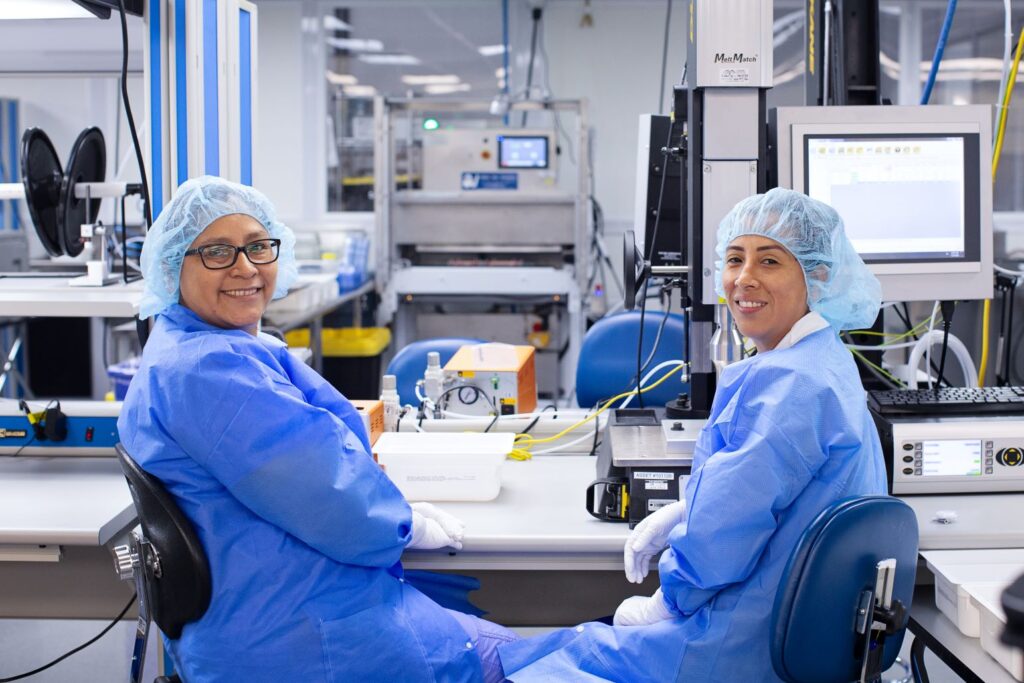Your product could change lives – but only if it gets to market successfully.
The road to launching a successful medical device is filled with regulatory hurdles, tight budgets, and production challenges. That’s where, too often, promising medical device startups stumble – not because of a bad idea, but because of a bad manufacturing partner. Choosing the wrong contract manufacturer can result in delays, failed audits, and skyrocketing costs.
A survey conducted in late 2024 reported that over 42% of industry professionals identified regulatory constraints as the biggest obstacle to bringing medical products to market in a timely manner. Picking the right contract manufacturer can help you avoid regulatory obstacles.
If you’re launching a flagship product, here are the top mistakes you can’t afford to make – and how to choose a partner who’s truly equipped to help you scale.
1. Prioritizing the Lowest Cost Over Long-Term Value
It’s natural for startups to be budget-conscious, especially in the early stages. But too often, young companies fall into the trap of choosing the lowest cost manufacturer without evaluating the long-term consequences. For instance, in 2023, the U.S. medical device industry experienced 975 recalls, a 7% increase from the previous year, with quality concerns accounting for 15.6% of these recalls. These recalls not only incur direct costs but also damage reputations and delay market entry.
Some red flags to watch for include:
- Labor cost that seems too good to be true (and often are).
- An inflexible or unrealistic cost model that doesn’t adapt to changes in your production volume or supply chain needs.
- Inexperienced partners who say that they can do everything for you.
Startups must think beyond initial costs. Consider the value of cost savings that come from operational efficiency, compliance readiness, avoiding pitfalls, and the ability to scale quickly. A reputable, experienced contract packaging company may not be the cheapest on paper, but it can deliver better long-term returns through reduced errors, production efficiencies, stronger documentation, and consistent product quality.
2. Overlooking Regulatory and Quality Expertise
One of the most dangerous mistakes medical device companies make is underestimating the importance of regulatory compliance. The medical device industry is heavily regulated, and failing to meet compliance standards can lead to product recalls, penalties, and delayed market entry.
To avoid this pitfall:
- Work only with contract manufacturing services providers that are ISO 13485 certified and FDA registered.
- Ask for proof of previous successful audits, especially if you’re preparing for U.S. or international regulatory submissions.
- Confirm that the manufacturer has experienced Quality Assurance professionals who understand the regulations for medical devices.
- Startups developing innovative medical technology must integrate quality assurance into every step of the manufacturing process.
The right partner will help design quality systems that ensure traceability, risk mitigation, and total compliance from design through to finished products.
3. Failing to Vet Partner’s Manufacturing Capabilities
It’s easy to be swayed by glossy brochures and a polished sales pitch. However, not all manufacturing partners can deliver what they promise. If a startup fails to properly vet a potential partner’s true capabilities, it can face disastrous production delays or quality issues later on.
Before signing on with a contract manufacturer, ask:
- Do they have cleanroom environments, such as ISO 7/Class 10,000, that meet your production and sterilization needs?
- Can they handle your projected production volume today—and what about in six months or a year?
- What are their areas of expertise, and can they provide referrals? For example, packaging, assembly, labeling, and sterilization all require unique capabilities. Additionally, explore how they manage component suppliers, as 79% of life sciences companies reported supply chain disruptions in the last 12 months. A lack of visibility into the extended supply chain can lead to unexpected delays or compliance risks, and the right partner should provide transparency, traceability, and tight control over their entire supply chain.
4. Ignoring Scalability and Flexibility
Your chosen Contract Manufacturing Organization (CMO) should be able to scale production in tandem with your company’s growth. Without considering scalability and flexibility, you may find yourself switching vendors just as you’re gaining traction in the market. The global medical device contract manufacturing market is projected to grow from USD 78.9 billion in 2024 to USD 149.4 billion by 2029, reflecting a compound annual growth rate (CAGR) of 11.4%. Partnering with a manufacturer that can adapt to increasing production demands and evolving product lines is crucial for long-term success.
Key questions to ask:
- Can this CMO grow with my company as we expand our product portfolio?
- Are they experienced in working with medical technology companies that evolve quickly and introduce multiple products?
- Will they prioritize your orders as your needs shift or as you begin targeting new markets?
Look for a potential partner who understands the growth trajectory of a medical device startup and is willing to work collaboratively to manage inventory, scale production, and streamline operations as your business grows.
5. Choosing a Partner Without Shared Vision or Financial Stability
Successful partnerships depend not just on technical capabilities but on cultural alignment and mutual trust. Some startups rush into manufacturing agreements without thoroughly assessing the financial stability or business philosophy of their potential suppliers.
A few things to evaluate:
- Is the company financially sound and capable of investing in new equipment, staff, or infrastructure if your volumes increase?
- Are they familiar with the regulations and business environment of the country you’ll be primarily selling in?
- Do they show commitment to innovation and continually invest in their operations, such as exploring the use of artificial intelligence or advanced automation in their processes?
Shared vision, reliability, and responsiveness matter just as much as machinery and certifications. The best partners feel like extensions of your internal team and provide support across planning, risk management, and speed-to-market.
Bonus Insight: Embrace Innovation to Stay Ahead
Innovative startups thrive when paired with equally forward-thinking contract manufacturers. As medical technology continues to evolve, modern contract manufacturing partners are embracing artificial intelligence and advanced data systems to improve quality control, supply chain forecasting, and productivity.
Ask about:
- Use of real-time data to reduce errors.
- Automated inspection systems that enhance product quality.
- Where they see the future of medical device CMOs and how they are planning to adapt.
An innovative mindset ensures your partner can help you stay competitive as you introduce your medical device to a rapidly changing market.

Conclusion: The Right Manufacturing Partner Can Make or Break Your Startup
The success of your medical device startup hinges on many factors – it requires the right partner from the very beginning. With the right contract manufacturer, you can streamline compliance, ensure consistent product quality, and bring your product to market with confidence.
At PRO-TECH Design, we help medical device startups turn ideas into compliant, market-ready success stories. With over 40 years of experience, ISO 13485 certification, FDA registration, and world-class manufacturing facilities, we serve as a true partner across the entire production process—from packaging design and assembly to labeling and sterilization.
Whether you’re introducing a new product or scaling your product portfolio, we’re here to help you succeed.
FAQs
- What are the most common contract manufacturing mistakes made by startups?
Startups often prioritize low cost over value, overlook regulatory needs, fail to vet capabilities, ignore scalability, and choose partners without financial stability or shared goals.
- Why is ISO 13485 certification important for a contract manufacturer?
ISO 13485 ensures that the manufacturer meets stringent quality and regulatory standards required in the medical device industry, reducing risk and ensuring product integrity.
- How can medical device startups avoid common startup manufacturing challenges?
By conducting thorough due diligence, aligning with a full-service contract packaging company, planning for scalability, and partnering with a company experienced in compliance and innovation.
- What should I consider when choosing a contract manufacturer in the United States?
Look for a financially stable, U.S.-based company with cleanroom facilities, end-to-end services, and experience in contract manufacturing services for medical device companies.
- What role does artificial intelligence play in contract manufacturing?
Artificial intelligence can and will play a variety of roles in contract manufacturing, and we are just at the beginning. Some examples include enhancements to the manufacturing process by enabling predictive maintenance, real-time quality control, and process optimization, leading to faster and more accurate production.
- Why should startups avoid choosing the lowest-cost manufacturer?
Choosing solely on price often leads to sacrifices in product quality, scalability, or compliance. A low labor cost may indicate a lack of skilled workers or poor-quality control.
- How can a manufacturer help me bring my product to market faster?
A seasoned partner like PRO-TECH can help you through every step—from packaging design, assembly efficiency, sourcing component suppliers, and managing the production process to delivering finished products ready for market.
- How do I evaluate if a potential partner is financially stable?
Ask about company growth, investments in technology, existing client base, and long-term contracts. A stable partner can better weather market fluctuations and support your growth.

